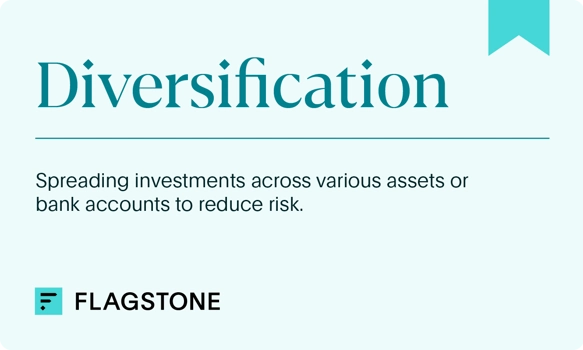REITs: at a glance
- What do I need to know? REITs let you earn a passive income by investing in properties without managing buildings yourself.
- What does it mean for me? A REIT could help grow your wealth and mitigate risk as part of a balanced portfolio.
- Why does it matter? Passive income streams can ensure your finances remain strong, even when the unexpected happens.
You can strengthen your finances by diversifying income streams. It’s one of the primary reasons that buy-to-let properties have been so popular over the past few decades.
A recent study concluded that there were 400,000 companies with buy-to-let holdings in the UK in 2025. A significant proportion of these companies are small-scale landlords, owning a handful of properties. But owning property yourself is a responsibility, as well as an opportunity.
Scaling the investment can be difficult, requiring significant maintenance with every new building you own. Enter REITs: an investment you can buy that takes the management out of the property equation.
But how do they work, and how can you assess whether to add a REIT to your portfolio? In this guide, you’ll learn about the different types of REITs, how they can strengthen your savings and investment portfolio, and how to spot top-performing trusts.
What are REITs?
Real Estate Investment Trusts (REITs) are publicly-traded companies that own and manage properties. They make money through rental income, sales, and mortgages.
REITs can include residential homes, retail buildings, offices, and more. There are different types of REITs that earn money on rent, mortgages, or a combination of both.
So, you can diversify your investment portfolio to protect against risk - even if you already have a personal mortgage or own rental property.

How do REITs differ from real estate investment?
REITs lower the upfront cost of investing in buildings, allowing you to spread your wealth among a broader range of property types relatively easily.
Instead of using up your cash to buy property alone or with other investors, REITs let you buy shares in the trust. When you invest directly in real estate, you earn money either by selling the property for a profit or through rental income.
Once you sell, HMRC will charge you Capital Gains Tax on your profits. With a REIT, you can earn money on the entire portfolio of buildings, provided you leave your money invested in the trust.
REITs must pay you their profits
By law, REITs must give at least 90% of their taxable income as dividends to shareholders. This means they can provide a regular stream of income.
By contrast, real estate firms may choose to reinvest some of their earnings back into the business each year. In return for this ‘90% rule’, REITs are exempt from paying UK corporation tax on their rental income.
This means you take home more of what you earn on your investment. REITs must also invest at least 75% of their funds in property, and earn over 75% of their gross income from their rent or sales.
If they don’t meet these requirements, they’re treated as regular corporations and taxed accordingly.
What are the different types of REITs?
You can invest in multiple types of REITs, which earn money in different ways:
- Equity REITs: earn rent generated from residential homes, offices, and commercial property.
- Mortgage REITs: make money from interest earned on mortgages.
- Hybrid REITs: combine both of the above.
Exploring the advantages of REITs
There are additional advantages to investing in REITs, including:
Tax relief: You can invest in REITs through Stocks and Shares ISAs or Self-Invested Personal Pensions (SIPPs). This combines the benefits of higher earnings with the tax advantages of annual ISA allowances or tax-deferred growth on your pension.
Protection against inflation: Property values and rent prices tend to rise with inflation. This means REITs can provide both protection and growth for your purchasing power.
Access to cash: Depending on the REIT, you may be able to sell your shares to get access to your cash. This isn’t always possible with other investments and savings, which rely on limiting access to your money to prioritise growth.
As with every investment, there’s no guarantee that you’ll make money in a REIT. Let’s look at some of the disadvantages of investing in them.
Understanding the possible disadvantages of REITs
REITs come with some risks that can affect how much money you take home:
- Market volatility: As REITs are publicly traded on the stock exchange, their share prices can fluctuate - even if the real estate market remains stable.
- Interest rate sensitivity: REITs are exposed to the same risks as the property market, including rising interest rates. Higher rates can increase borrowing costs for both REITs and homeowners, making real estate a less attractive investment.
- Tax implications: Because REITs distribute dividends to investors, rather than reinvesting their profits, your earnings are taxed as income. For higher earners, your marginal rate is higher than the Capital Gains Tax rate, meaning you may pay even more in tax.
- International investment and Brexit: Some UK-based REITs invest in overseas properties. Post-Brexit, rule changes relating to property and tax between the UK and EU could lead to higher costs or additional legal considerations, making REITs less profitable.
Characteristics of high-performing REITs
The best REITs not only grow your wealth, but limit your risk.
Depending on your investment goals, you might look for trusts with a:
- history of high returns
- handful of locations
- strong mix of properties
- focus on environmental and social impact.
How to invest in REITs
Depending on your risk tolerance and savings strategy, you can invest in:
- individual REITs: Trusts within specific property sectors or geographic markets. They can sometimes pay out higher dividends than REIT funds.
- REIT funds: Spread your money across different property types and markets. There is always risk with investing, so consider speaking to a financial advisor for guidance on your personal circumstances.
- tax-efficient accounts: Use Stocks and Shares ISAs to buy REITs to keep more of the profits you earn. You can then take your earnings in a year when your income band is lower.
- private REITS: These may be available through brokers or financial advisors. They often require higher minimum deposits and can be harder to sell your shares if you need to. As a result of restricted access to your cash, they may offer greater returns.
Frequently asked questions about REITs
Is a REIT a good investment?
REITs are often considered a valuable addition to a balanced portfolio as they can provide tax efficient ways to gain wealth that outpaces inflation.
They also make real estate investment more widely available to those who don’t want to buy physical property. This means you can invest exactly what you want and quickly sell your shares if you want to reinvest your cash elsewhere.
What’s the difference between REITs vs. ETFs?
REITs are similar to Exchange-Traded Funds (ETFs) because you invest in a portfolio without managing assets directly. The difference is that REITs deal exclusively with property.
ETFs invest in stocks, bonds, and commodities (raw materials and products that can be bought and sold).
Can I invest in a REIT directly?
Yes, you can invest directly in publicly-listed REITs through a brokerage account.
You can also invest in REITs through funds or ETFs, if you don’t want to pick individual REITs yourself.
Spread your risk, grow your wealth
REITs let you earn passive income from the real estate market without the challenges of buying, selling, or managing bricks and mortar.
Building a portfolio with a range of savings and investments options, like mixing REITs and high-interest savings accounts, spreads your risk while growing your wealth for the long term.
Explore Flagstone’s high-interest accounts
Don’t let your money languish in low-interest accounts.
Flagstone lets you spread your cash between hundreds of high-interest savings accounts.
All in one platform, with one password.





